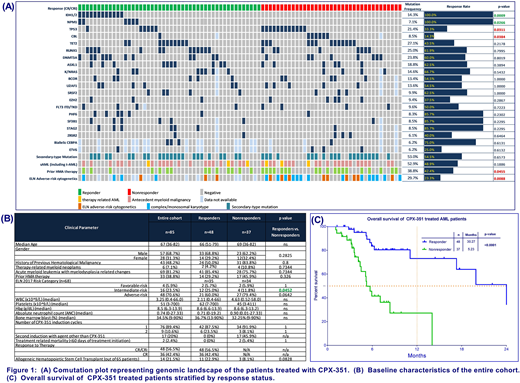Abstract
Background: Approval of CPX-351 has changed the treatment landscape for therapy-related acute myeloid leukemia (t-AML) or AML with myelodysplasia-related changes (AML-MRC) and has become the new standard-of-care. Response rates (RR) (complete remission (CR) and CR with incomplete count recovery (CRi)) with CPX-351 in the phase 3 clinical trial were 47.7%, however, comprehensive molecular characterization to investigate impact on response was lacking. Herein, we annotated the molecular profiles of patients (pts) treated with CPX-351 to identify outcome interaction with specific somatic mutations.
Methods: We retrospectively analyzed a combined cohort of 111 pts treated with CPX-351 from Moffitt Cancer Center, Weill Cornell Medical College, and Memorial Sloan Kettering Cancer Center. A total 85 pts that had next-generation sequencing (NGS) prior to treatment were included in the analysis. Those genes analyzed with >5% mutation frequency are summarized in Figure 1A. Demographics, disease-specific variables, and overall outcomes were analyzed and responders (RES) were defined as pts achieving CR/CRi after 1-2 cycles of CPX-351 compared to nonresponders (NR). AML patients with diagnosis of antecedent myeloid malignancy are defined as sAML. Pts receiving a second cycle of induction (reinduction) with a different regimen were considered to be NR to CPX-351. We utilized Fisher's exact test to determine two-tailed significance with p-value <0.05. Kaplan-Meier analysis with log-rank test was performed to estimate median overall survival (mOS) and was calculated from time of CPX-351 administration to last follow-up or death.
Results: Baseline characteristics of the entire cohort are outlined in Figure 1B. Overall, 38.8% of pts (n=33) received a hypomethylating agent for an antecedent myeloid malignancy prior to CPX-351 with 21.5% of pts (14/65) being bridged to allogeneic stem cell transplant (aSCT).
Among the 85 pts informative for somatic gene mutations, 91.8% (n=78) treated with CPX-351 had at least one mutation at baseline (median 3, range 0-8). Overall, there were 55.3% RES (n=48) and 43.5% NR (n=37). There was no difference in the median number of mutations between RES (n=3, range 0-8) and NR (n=3, range 0-7). Further, there was no difference in RR in pts with secondary-type mutations (as defined by Lindsley et al, Blood 2015) (54.5% vs. 45.5%, p=0.71). Similarly, genes involved in epigenetic regulation, RNA splicing, or transcription and signaling were equally distributed among RES and NR.
RR according to specific mutated gene is summarized in Figure 1A. Although subgroup size is small, all patients (100%) with IDH1/2 or NPM1 mutations were responders to CPX-351 (n=12; p<0.001 for IDH1/2 and n=6; p=0.03 for NPM1). High RR (>70%) were also observed in pts with rare mutations such as STAG2 (n=6), SF3B1 (n=6), PHF6 (n=6) or biallelic CEBPA (n=3). In contrast, RR were significantly lower in pts with TP53 (33.3%; n=18, p=0.03) or CBL (14.3%; n=7, p=0.04 mutations. In sAML pts specifically (n=45), overall RR to CPX-351 was 48.9% with higher RR in SF3B1 and IDH1/2 mutant pts (p=0.02 and p=0.002, respectively). Detailed analysis of TP53 mutated AML treated with CPX-351 and responses will be presented by our collaborators (Goldberg et al., ASH 2018 submitted).
The RR in pts with ELN-defined adverse-risk cytogenetics (n=30) was significantly lower, 23.3% (n=7), compared to 52.11% in pts with intermediate/favorable risk cytogenetics (n=37) (p=0.009). Among pts with complex or monosomal karyotype (n=18), RR was 22.2% (n=4).
Median OS for the entire cohort was 14.03 months (mo) with an estimated 1-year OS of 54.6% with median follow-up of 7.93mo (Figure 1C). The OS in RES was 30.3mo compared to 5.2mo in NR (p <0.0001). Overall, 9 pts received reinduction with CPX-351 with 66.7% achieving CR/CRi, whereas 17 pts received a cladribine-based regimen with 7 pts (41.1%) achieving CR/CRi (p=0.411).
Conclusions: We conclude that response to CPX-351 is dependent upon the underlying molecular architecture, with NPM1 and IDH1/IDH2 mutations highly responsive to CPX-351, whereas mutations in CBL and TP53, and complex/monosomal karyotype have a lower probability of benefit. Importantly, there was no difference in RR in sAML vs AML with secondary-type mutations. Together, these data support molecular mutation profiling as a biomarker for response and outcome with CPX-351 which should be validated in a prospective study.
Goldberg:Pfizer: Research Funding; AROG: Research Funding; Abbvie: Research Funding; Celgene: Research Funding. Desai:Argenx: Consultancy; Cellerant Inc: Consultancy. Komrokji:Novartis: Honoraria, Speakers Bureau; Novartis: Honoraria, Speakers Bureau; Novartis: Honoraria, Speakers Bureau; Celgene: Honoraria, Research Funding; Celgene: Honoraria, Research Funding; Novartis: Honoraria, Speakers Bureau. Kuykendall:Celgene: Honoraria; Janssen: Consultancy. List:Celgene: Research Funding. Roboz:Otsuka: Consultancy; Novartis: Consultancy; Bayer: Consultancy; Celltrion: Consultancy; AbbVie: Consultancy; Pfizer: Consultancy; Novartis: Consultancy; Celgene Corporation: Consultancy; Orsenix: Consultancy; Orsenix: Consultancy; Daiichi Sankyo: Consultancy; Bayer: Consultancy; Eisai: Consultancy; Cellectis: Research Funding; Janssen Pharmaceuticals: Consultancy; Astex Pharmaceuticals: Consultancy; Jazz Pharmaceuticals: Consultancy; Cellectis: Research Funding; Aphivena Therapeutics: Consultancy; Sandoz: Consultancy; Celgene Corporation: Consultancy; Jazz Pharmaceuticals: Consultancy; Eisai: Consultancy; Otsuka: Consultancy; Roche/Genentech: Consultancy; AbbVie: Consultancy; Sandoz: Consultancy; Celltrion: Consultancy; Pfizer: Consultancy; Daiichi Sankyo: Consultancy; Roche/Genentech: Consultancy; Aphivena Therapeutics: Consultancy; Argenx: Consultancy; Argenx: Consultancy; Janssen Pharmaceuticals: Consultancy; Astex Pharmaceuticals: Consultancy. Tallman:BioSight: Other: Advisory board; Daiichi-Sankyo: Other: Advisory board; AROG: Research Funding; Orsenix: Other: Advisory board; AbbVie: Research Funding; Cellerant: Research Funding; ADC Therapeutics: Research Funding. Sallman:Celgene: Research Funding, Speakers Bureau. Sweet:BMS: Honoraria; Agios: Consultancy; Novartis: Consultancy, Honoraria, Speakers Bureau; Jazz: Speakers Bureau; Astellas: Consultancy; Phizer: Consultancy; Jazz: Speakers Bureau; BMS: Honoraria; Celgene: Honoraria, Speakers Bureau; Novartis: Consultancy, Honoraria, Speakers Bureau; Celgene: Honoraria, Speakers Bureau; Phizer: Consultancy; Astellas: Consultancy; Agios: Consultancy.
Author notes
Asterisk with author names denotes non-ASH members.


This feature is available to Subscribers Only
Sign In or Create an Account Close Modal